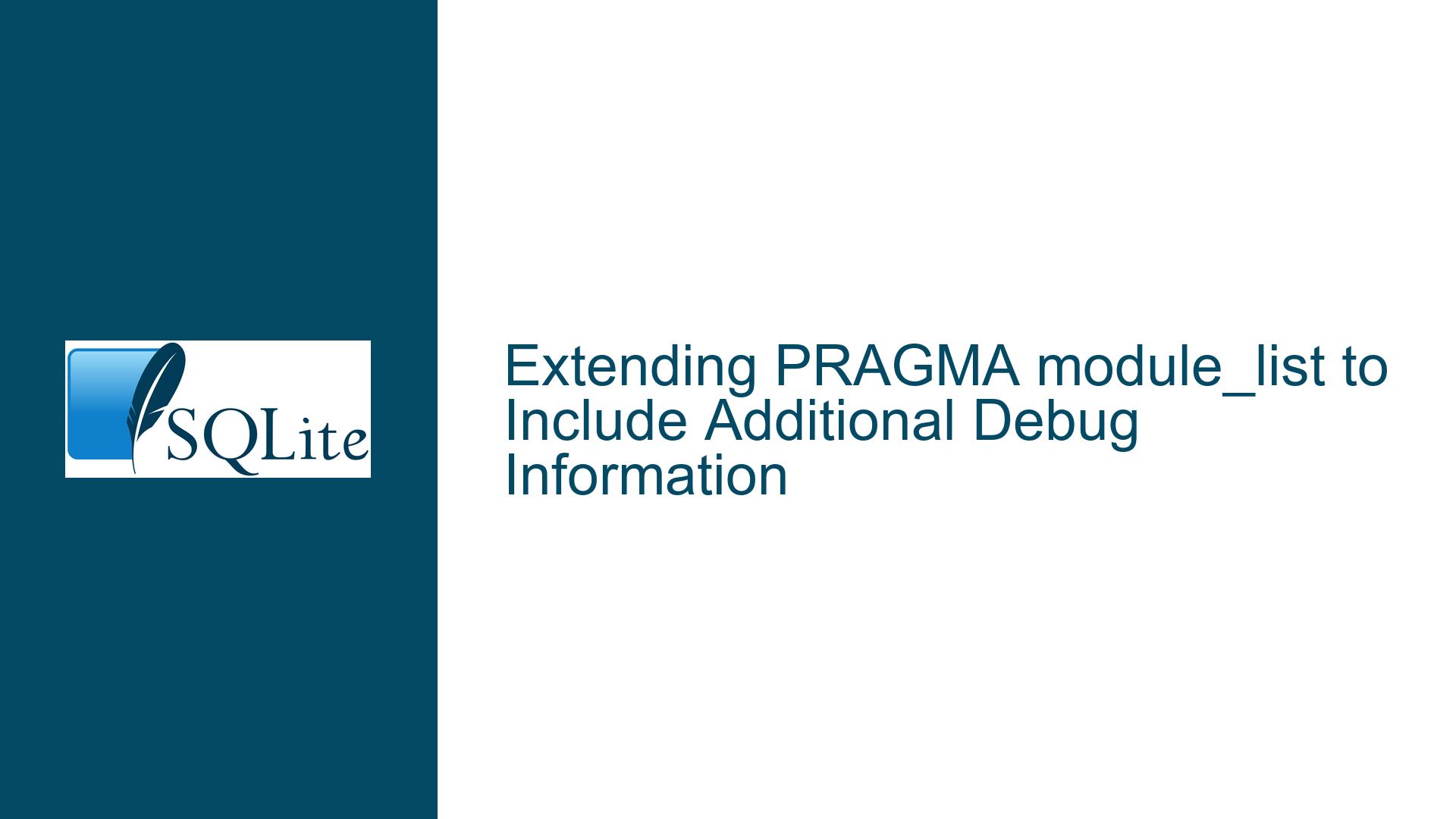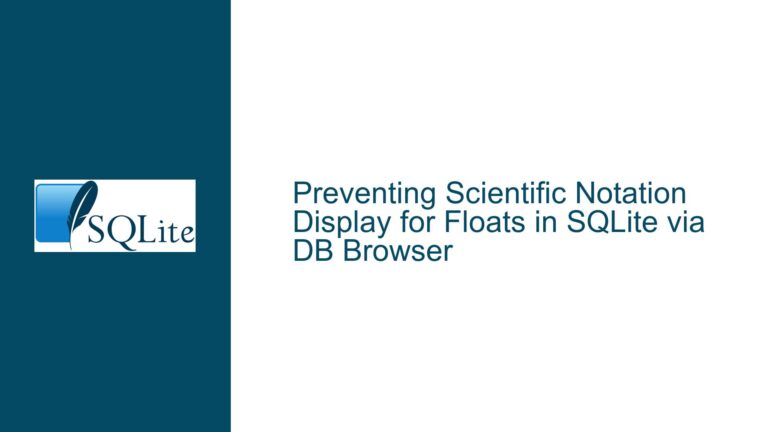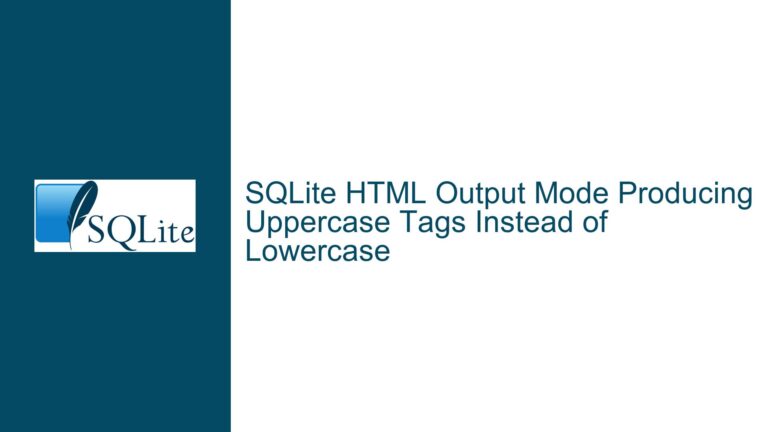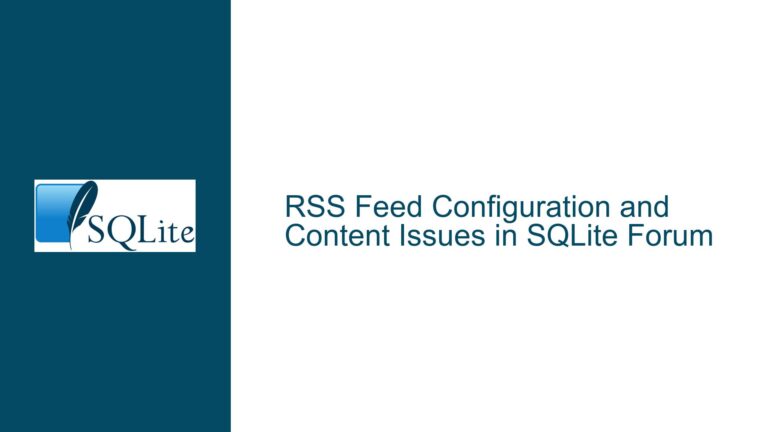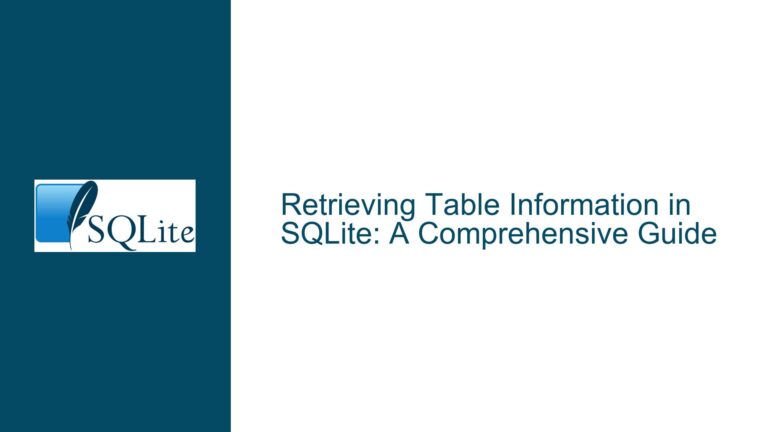Extending PRAGMA module_list to Include Additional Debug Information
Issue Overview: Extending PRAGMA module_list for Enhanced Debugging Capabilities
The core issue revolves around the desire to enhance the PRAGMA module_list command in SQLite to provide more detailed debugging information. Currently, PRAGMA module_list returns a virtual table with a single column, name, which lists the names of the modules registered with the SQLite database connection. While this is useful for basic identification, it falls short when more in-depth debugging is required. The proposal suggests adding two additional columns to the output: version and filename. The version column would display the version of the VFS API that the module supports, while the filename column would show the path or name of the file from which the module was loaded.
The rationale behind this request is rooted in the need for better debugging tools, especially when dealing with custom modules. Debugging custom modules can be challenging, particularly when issues arise from module compatibility or loading problems. Having access to the module’s version and the file from which it was loaded could significantly streamline the debugging process. For instance, knowing the version of the VFS API that a module supports could help identify compatibility issues, while the filename could provide insights into whether the correct module is being loaded.
However, the implementation of such an extension is not straightforward. The filename column, in particular, presents several challenges. First, the filename is not always stored for modules, especially those that are compiled directly into the application rather than loaded dynamically. Second, even if the filename were available, exposing it could pose security risks. File paths can reveal information about the underlying system, such as the operating system type (Windows, Mac, Unix-esque), which could be exploited by attackers. Therefore, while the idea has merit, it requires careful consideration of both technical feasibility and security implications.
Possible Causes: Why PRAGMA module_list is Limited in Its Current Form
The limitations of the current PRAGMA module_list implementation can be attributed to several factors. First, the primary purpose of PRAGMA module_list is to provide a simple, lightweight way to list the modules registered with a SQLite database connection. The command was designed with simplicity in mind, focusing on the most essential information: the module names. This design choice aligns with SQLite’s overall philosophy of being a lightweight, embedded database engine that prioritizes efficiency and minimalism.
Second, the lack of additional columns in PRAGMA module_list is partly due to the way modules are typically integrated into SQLite. Many modules are compiled directly into the application that uses SQLite, rather than being loaded dynamically from external files. In such cases, the concept of a "filename" may not even apply, as the module code is embedded within the application binary. This makes it difficult to provide a meaningful filename in the PRAGMA module_list output.
Third, there are security considerations that discourage the inclusion of potentially sensitive information, such as file paths, in the output of PRAGMA module_list. Exposing file paths could inadvertently reveal details about the system’s directory structure, which could be exploited by malicious actors. For example, knowing that a module was loaded from a specific directory could give an attacker clues about the system’s configuration, potentially aiding in the development of targeted attacks.
Finally, the decision to not extend PRAGMA module_list at this time is also influenced by the perceived utility of the additional information. While the version column could be useful for debugging, it is not clear that the benefits outweigh the costs of implementing and maintaining the additional code. The version information, specifically the iVersion field, indicates the version of the VFS API that the module supports, not the version of the module itself. This distinction limits the usefulness of the version column for debugging purposes, as it does not provide direct information about the module’s compatibility with other components.
Troubleshooting Steps, Solutions & Fixes: Enhancing PRAGMA module_list for Debugging
To address the limitations of PRAGMA module_list and enhance its utility for debugging, several approaches can be considered. These approaches range from simple workarounds to more complex modifications of the SQLite source code. Each approach has its own set of trade-offs, and the best solution will depend on the specific needs and constraints of the user.
1. Workaround: Using Custom Debugging Functions
One straightforward workaround is to implement custom debugging functions within the application that uses SQLite. These functions can be designed to provide the additional information that PRAGMA module_list currently lacks. For example, a custom function could be created to query the iVersion field of each module and return it alongside the module name. Similarly, if the application loads modules dynamically, it could maintain a record of the filenames from which the modules were loaded and provide this information through a custom debugging interface.
The advantage of this approach is that it does not require any changes to the SQLite source code, making it a relatively low-risk solution. However, it does require additional development effort to implement and maintain the custom debugging functions. Additionally, this approach may not be feasible in all cases, particularly if the application does not have control over how modules are loaded or if the modules are compiled directly into the application.
2. Modification: Extending PRAGMA module_list in SQLite Source Code
For users who are comfortable modifying the SQLite source code, another option is to extend the PRAGMA module_list command to include the desired additional columns. This would involve modifying the sqlite3Pragma function, which handles PRAGMA commands, to include the version and filename columns in the output of PRAGMA module_list.
To implement this modification, the following steps would need to be taken:
Step 1: Identify the Relevant Code Sections
Thesqlite3Pragmafunction is located in thepragma.cfile within the SQLite source code. This function is responsible for handling all PRAGMA commands, includingmodule_list. The code section that generates the virtual table formodule_listwould need to be modified to include the additional columns.Step 2: Add the Version Column
The version column would display theiVersionfield of thesqlite3_modulestructure. This field indicates the version of the VFS API that the module supports. To add this column, the code would need to be modified to extract theiVersionfield from each module and include it in the virtual table.Step 3: Add the Filename Column
Adding the filename column is more complex, as the filename is not typically stored for modules. If the modules are loaded dynamically, the filename could be obtained from thesqlite3_vfsstructure, which contains information about the virtual file system. However, this would require modifying the module loading process to store the filename in a way that it can be accessed byPRAGMA module_list.Step 4: Address Security Concerns
If the filename column is added, it is important to consider the security implications. One approach would be to only include the filename if it does not reveal sensitive information about the system. For example, the filename could be sanitized to remove any path information, leaving only the base name of the file.Step 5: Test the Modifications
After making the necessary modifications, the changes should be thoroughly tested to ensure that they do not introduce any new issues. This includes testing the modifiedPRAGMA module_listcommand with different types of modules, including those that are compiled into the application and those that are loaded dynamically.
The advantage of this approach is that it provides a more integrated solution, making the additional debugging information readily available through the standard PRAGMA module_list command. However, it requires a deeper understanding of the SQLite source code and carries the risk of introducing new bugs or security vulnerabilities.
3. Alternative: Using External Debugging Tools
Another approach is to use external debugging tools to gather the additional information that PRAGMA module_list does not provide. For example, tools like strace or ltrace can be used to trace the system calls and library calls made by the application, including those related to module loading. These tools can provide detailed information about the files that are accessed when modules are loaded, as well as the versions of the libraries that are used.
The advantage of this approach is that it does not require any modifications to the SQLite source code or the application itself. However, it may not be as convenient as having the information directly available through PRAGMA module_list, and it may require additional expertise to interpret the output of the debugging tools.
4. Future Considerations: Potential Enhancements to PRAGMA module_list
While the current implementation of PRAGMA module_list does not include the additional columns, it is worth considering potential future enhancements that could address the limitations discussed above. One possibility is to introduce a new PRAGMA command, such as PRAGMA module_details, that provides more detailed information about the modules. This command could include columns for the version, filename, and other relevant information, while keeping the original PRAGMA module_list command unchanged for backward compatibility.
Another possibility is to introduce a configuration option that allows users to enable or disable the inclusion of sensitive information, such as file paths, in the output of PRAGMA module_list. This would allow users to access the additional debugging information when needed, while minimizing the security risks.
In conclusion, while the current implementation of PRAGMA module_list has limitations, there are several approaches that can be taken to enhance its utility for debugging. The best solution will depend on the specific needs and constraints of the user, as well as their comfort level with modifying the SQLite source code or using external debugging tools. By carefully considering the trade-offs of each approach, users can find a solution that meets their debugging needs while minimizing the risks and costs associated with implementation.
